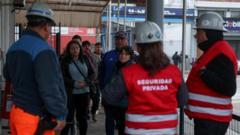The picturesque village of Villa Baviera in Chile, once home to a cult and a site of political torture during Pinochet's regime, is set to undergo changes as the government aims to transform part of it into a site of remembrance. While some residents support the initiative, others fear losing their homes and livelihoods, highlighting a deep divide within the community.
Chile's Villa Baviera: A Tourist Destination with a Troubling Past

Chile's Villa Baviera: A Tourist Destination with a Troubling Past
Once a secretive cult hub, Villa Baviera, formerly Colonia Dignidad, now faces a contentious transition as the Chilean government seeks to memorialize its dark history.
The Chilean village of Villa Baviera, known for its charming Bavarian-style architecture, is embarking on a controversial transformation. Nestled in the rolling hills of central Chile, the village was once known as Colonia Dignidad, a secretive religious sect founded by the notorious Paul Schäfer in 1961. This seemingly idyllic location was marred by a grim history of abuse, including separation of children from their families, harsh discipline, and even sexual molestation of minors.
Following the military coup led by Augusto Pinochet in 1973, the site became a notorious torture chamber for political prisoners. Many detainees were never seen again, leading to anguish within their families. Today, the Chilean government is moving forward with controversial plans to expropriate portions of the estate, aiming to honor the victims of the Pinochet regime and create a memorial site.
Luis Evangelista Aguayo, one of the victims, was taken from his home on September 12, 1973, and his family was left searching for answers until his disappearance. His sister, Ana Aguayo, represents the pain of countless families once connected to Colonia Dignidad, emphasizing the need for a place of memory rather than a tourist attraction.
However, this proposal has sparked fierce debate among current residents of Villa Baviera. Dorothee Munch, a lifelong inhabitant, claims that the expropriation threatens to make them victims again, uprooting their current lives after years of trauma. She and other residents argue that they endured their own sufferings while living in the colony and fear the loss of their homes and safety.
The plans include acquiring 117 hectares of the 4,829-hectare site, which contains buildings where untold atrocities occurred. Chile's Minister of Justice, Jaime Gajardo Falcón, argues that these sites must not be forgotten and should serve as a reminder of past horrors. Discussions around fair compensation for residents are ongoing, as many former inhabitants voice their support for the memorial but express concern over their future.
The divide in Villa Baviera mirrors broader national tensions as Chile comes to terms with the legacy of Pinochet's regime. As the nation grapples with its history, the fate of this unique village remains uncertain, caught between remembrance and the struggle for personal redemption.
Following the military coup led by Augusto Pinochet in 1973, the site became a notorious torture chamber for political prisoners. Many detainees were never seen again, leading to anguish within their families. Today, the Chilean government is moving forward with controversial plans to expropriate portions of the estate, aiming to honor the victims of the Pinochet regime and create a memorial site.
Luis Evangelista Aguayo, one of the victims, was taken from his home on September 12, 1973, and his family was left searching for answers until his disappearance. His sister, Ana Aguayo, represents the pain of countless families once connected to Colonia Dignidad, emphasizing the need for a place of memory rather than a tourist attraction.
However, this proposal has sparked fierce debate among current residents of Villa Baviera. Dorothee Munch, a lifelong inhabitant, claims that the expropriation threatens to make them victims again, uprooting their current lives after years of trauma. She and other residents argue that they endured their own sufferings while living in the colony and fear the loss of their homes and safety.
The plans include acquiring 117 hectares of the 4,829-hectare site, which contains buildings where untold atrocities occurred. Chile's Minister of Justice, Jaime Gajardo Falcón, argues that these sites must not be forgotten and should serve as a reminder of past horrors. Discussions around fair compensation for residents are ongoing, as many former inhabitants voice their support for the memorial but express concern over their future.
The divide in Villa Baviera mirrors broader national tensions as Chile comes to terms with the legacy of Pinochet's regime. As the nation grapples with its history, the fate of this unique village remains uncertain, caught between remembrance and the struggle for personal redemption.

















